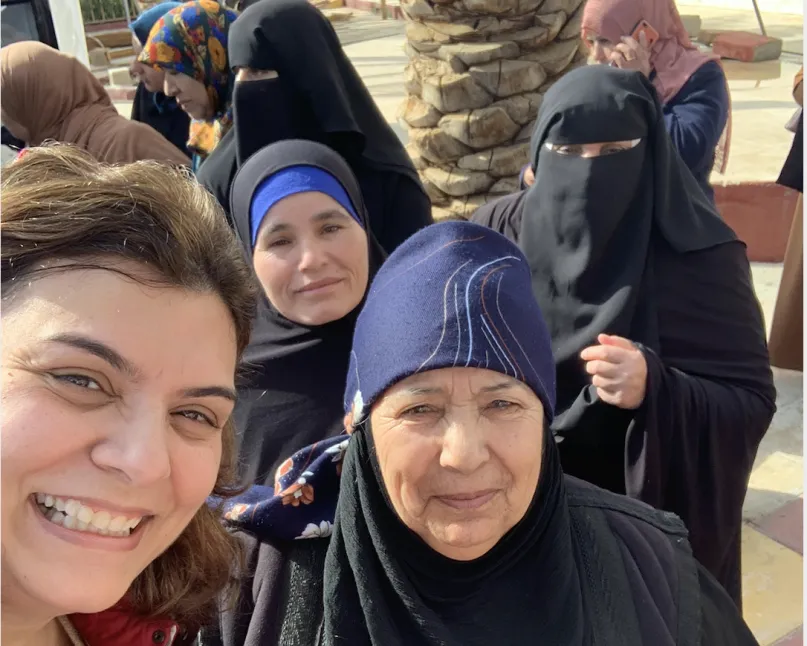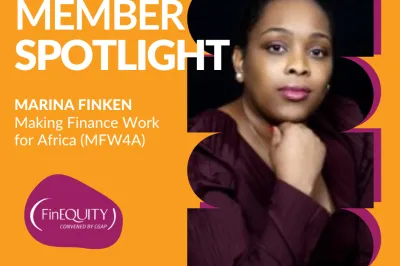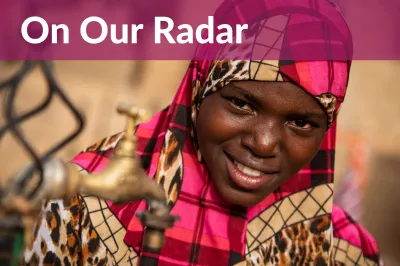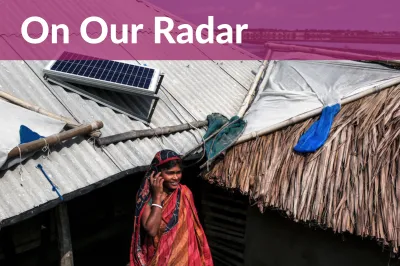Reham Gharbiyeh, Arab Women's Enterprise Fund

Please tell us a bit about the Arab Women's Enterprise Fund (AWEF)
AWEF was a 5-year project funded by DFID and established in 2015 to increase economic opportunities and benefits for 150,000 poor women in the Middle East and North Africa (MENA).
Although female labor force participation in Jordan is only 18%, (one of the lowest globally) women as entrepreneurs play a significant role in the informal labor market by operating micro-businesses. AWEF supported women-owned microbusinesses, and helped female employees gain further economic independence and well-being in Egypt, Jordan, and up until 2018, the Occupied Palestinian Territories (OPT).
What were the biggest challenges you saw for promoting women’s financial inclusion and how did you address them?
As we began our work promoting women’s economic empowerment through a Market System Development (MSD) approach, it quickly became evident that women within our value chains (small dairy producers, retailers, and others) were missing adequate access to financial services that would allow them to grow their working capital, expand their business or simply save for the future.
At the same time, we observed a paradox between the growing access to technology and the low uptake of digital financial services by women. Most Jordanian women in our value chains owned a mobile phone, yet they were slow to adopt digital financial services, especially in comparison with Sub-Saharan Africa. This was the case despite positive inroads by the Jordanian government and Financial Services Providers (FSPs) to make digital financial inclusion a national priority. As such, AWEF started to reflect on how DFS markets might work better for poor and disadvantaged women.
Building upon an in-depth market assessment of the constraints to women’s financial inclusion, AWEF in Jordan developed a strategy to ensure that market changes do not happen ‘in silos’, but rather in a ‘systemic and holistic’ way across the DFS market system. Building on this strategy, in 2017 AWEF launched interventions in Jordan to increase poor women’s access to (and ability to benefit from) digital financial services.
AWEF piloted innovative models presented with E-Wallet service providers Dinarak and ZainCash to launch several media campaigns to increase women’s awareness of how to utilize E-wallets in their daily tasks.
Additionally, to ensure that women are included in different parts of DFS value chains, we launched the first female agents network in the MENA region.
How did you help payment service providers attract female customers?
When we launched, we soon noticed that despite the fact that in Jordan women make up 50% of the potential customer base for digital service providers such as mobile e-wallets, payment service provider firms found it challenging to attract female customers.
AWEF began promoting changes to attract more women to financial systems through opening mobile E-Wallet accounts and ensuring women are using mobile money solutions such as payments, savings, credit, or insurance in their daily operations. Working closely with our partners we managed to attract more than 80,000 new female clients distributed geographically across Jordan.
Working with the PSP Mahfazti and the National Microfinance Bank (NMB), we investigated the impact of digitalizing microfinance loans on use of mobile wallets. The experiment invited 1000 female NMB clients to receive and repay their loans through Mahfazti mobile wallet. So far nearly 170 women have opened mobile wallets as a result of this intervention. This initial rollout will serve as a demonstration case to the broader client base of women."
We also worked with Dianrak and ZainCash to increase female representation in non-traditional roles, such as mobile money agents. This helped to empower women entrepreneurs whilst also providing local women with access to mobile money solutions.
This proved to be particularly important during COVID19, as female agents were able to provide cash-in-cash out services to local women in their own communities while banks were closed for weeks and mobility was restricted as a result of government curfews.
Tell us a bit about yourself. What role did you play at AWEF and how did you get into this line of work?
I was born and raised in Doha, Qatar but am Jordanian and currently live in Amman. I have a medical background and have worked in local and regional economic development for the past 20 years, with a focus on employment, enterprise innovation, and women’s economic empowerment.
For the past 5 years, I served as AWEF’s Jordan Country Director. In this role, I worked with over 25 partners from across government, private sector, and donor organizations. I designed and implemented interventions to facilitate home-based business registrations, support youth employment, and re-vamp Jordan’s social enterprise legal framework. Additionally, I worked with FinTech companies to include more female clients in the digital financial system.
How was the AWEF approach innovative?
AWEF focused on taking a facilitation approach to working with the private sector. This meant that we needed to build strong business cases to convince partners and utilize market actors’ resources. This turned out to be really challenging at the beginning, because at the same time that we were launching, Jordan began to experience a dramatic surge in donor funding as a result of the Syrian crisis. International donors were sending funding intended to support host communities and ease the integration of refugees. This money was channeled through local NGOs and government-specialized agencies by way of programs and projects. The result for us was that incentives to work on the new innovative approaches we were supporting were really weak at the beginning of our work.
Nonetheless, with constant focus and belief in our methodology, we were able to move forward and reach our goals, which included making sure that all parties were aligned so that we could ensure impact and sustainability beyond the lifespan of AWEF.
AWEF was always scheduled to end in April 2020, which meant that we had to close down during a global pandemic. Like most everywhere else, Jordan was put in continued lockdown and entire industries went into crisis management. This was very difficult for the women we serve, and it was also tough for us psychologically. In any case, we managed to deliver all deliverables without jeopardizing quality.
What role does FinEquity play in your work?
I am very new to FinEquity, but already I have benefited from the opportunity to share our work, which is a critical part of showing others that progress is possible in the MENA region. We would like to encourage others to take on women’s economic empowerment in Jordan and elsewhere.
It would be very helpful for us if the FinEquity platforms could be expanded to include translation of our blogs, and other channels so that we are able to continue sharing our story with Arabic speaking communities.
Do you have a success story you’d like to share with us?
I’d like to tell you about Badriah, who lives with her husband and seven children in Al Ramtha, in the northern part of Jordan, near the Syrian border.
Badriah started a home-based business in dairy processing and traditional Jordanian cooking when her household was facing financial stress. However, she quickly found it difficult to launch a successful business as she had minimal capital.
Through one of AWEF's Women Economic Empowerment Units, which we established in 14 municipalities across Jordan, Badriah was able to undertake business management training, and also received a first set of equipment to start her business.
Badriah then went onto participate in further training developed by AWEF allowed her to grow into being a successful businesswoman. As a licensed producer who has been invited to multiple events, festivals, and bazaars, Badriah has been able to pay back her family’s debt less than two years after she began her business. She has a Facebook page where she markets her catering abilities and the food items she produces, and she has been on national television four times to share the story of how she built and grew her clientele all over Jordan.
Bardiah is just one of over 9,000 women across Jordan who benefited from the WEE units. That's my favorite success story!


